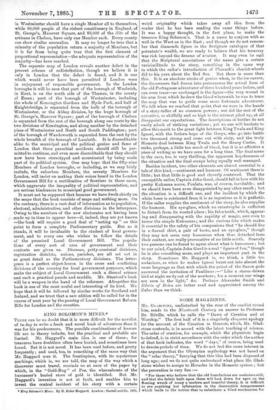KING SOLOMON'S MINES.* THERE can be no doubt that it
is more difficult for the novelist of to-day to write a fresh and novel book of adventure than it was for his predecessors. The possible combinations of human life are in theory infinite, but the practical and probable are limited. Mr. Haggard's main idea is one of these ; for treasures have doubtless often been buried, and sometimes been found. But it is not novel. It has been used before, and pretty frequently ; and used, too, in something of the same way that Mr. Haggard uses it. The frontispiece, with its mysterious markings, which is, we are told, the map of the way which a discoverer must travel, reminds us at once of the paper by which, in the " Gold-Bug " of Poe, the whereabouts of the buccaneer's buried store of gold is identified. But Mr. Haggard's invention is not at fault, and enables him to invest the central incident of his story with a certain
• King Solomon's Mines. By H. Rider Haggard. London : Cassell and Co. 1885. weird originality which takes away all idea from the reader that he has been reading the same things before. It was a happy thought, in the first place, to make the treasure King Solomon's. That is a name to conjure with as well in the West as in the East ; and though we do not remem- ber that diamonds figure in the Scripture catalogue of that potentate's wealth, we are ready to believe that his treasury was rich beyond the dreams of avarice. It may even be said that the Scriptural associations of the name give a certain verisimilitude to the story, something in the same way in which the sailor's introduction of Pharaoh's chariot-wheels did to his yarn about the Red Sea. But there is more than this. It is an absolute stroke of genius when, in the ice-cavern, the discoverers find frozen into permanence the actual form of the old Portuguese adventurer of three hundred years before, and can even trace—so unchanged is the figure—the very wound in his arm from which he drew the blood wherewith he was to trace the map that was to guide some snore fortunate adventurer. We felt when we reached that point.tho.t we were in the hands of a story-teller of no common powers ; nor did the rest of the narrative, so skilfully and so high is the interest piled up, at all disappoint our expectations. The descriptions of battles do not easily admit of striking variations ; yet no one will hesitate to allow this merit to the great fight between King Twala and King Ignosi, with the forlorn-hope of the Greys, who go into battle two thousand strong and come out with sixty, and, the truly Homeric duel between King Twala and Sir Henry Curtis. It reeks, perhaps, a little too much of blood, but it is as effective a piece of writing as we have seen for a long time. The final scene in the cave, too, is very thrilling, the apparent hopelessness of the situation and the final escape being equally well managed.
Besides incident, two other elements are almost essential in a tale of this kind,—sentiment and humour. Of sentiment there is little; but that little is good and cleverly contrived. That the susceptible sailor, Captain John Good, should fall in love with his pretty Kukuana nurse, Fonlata, was, of course, inevitable; and we should have been even disappointed by any other result ; but the situation is a difficult one, and the incident by which the white lover is extricated from it is as ingenious as it is pathetic. If the sailor supplies the sentiment of the story, he also supplies the humour. His eye-glass, which no catastrophe is sufficient to disturb from its wonted place ; his false teeth, which, appear- ing and disappearing with the rapidity of magic, awe even to terror the simple Kukuanas ; and the curious fate which makes it essential to the safety of his companions that "he should live in a flannel shirt, a pair of boots, and an eye-glass," though they may not seem very humorous when thus detached from their context, are really provocative of no little mirth. Scarcely two persons can be found to agree about what is humorous ; but to our mind, Captain John Good is a real " figure of fun," though he is also something more, and plays an important part in the story. Sometimes Mr. Haggard is, we think, a little too audacious, as when he makes Ignosi burst out into almost the same language as that with which the priest of the Saxon gods answered the invitation of Paullinus :—" Like a storm-driven bird at night we fly out of the nowhere ; for a moment our wings are seen in the light," &c. Perhaps Alexander Smith and Edwin of Deis-a are better read and appreciated among the Zulus than we think.














































 Previous page
Previous page